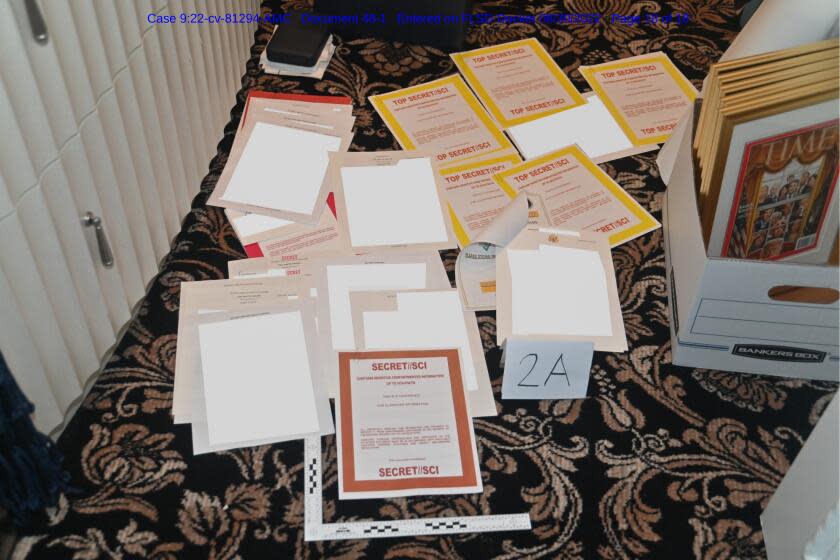Litman: Aileen Cannon's handling of Trump's classified records case just went from bad to horrible

As the judge presiding over the federal prosecution of Donald Trump for hoarding classified records at his Florida estate, Aileen Cannon has been a dubious influence from the start. She has consistently indulged Trump’s far-fetched legal arguments and overall strategy of delay.
But her latest order confirmed that Cannon has truly crossed the line into running interference for the former president who put her on the bench.
The order, issued by Cannon Monday evening, concerns one of Trump’s recurrent and baseless arguments for dismissal of the charges. His lawyers claim that the Presidential Records Act gave him the power to reclassify any and all records as “personal” and that he did so through the mere act of putting them in the bankers boxes he had spirited away to Mar-a-Lago.
Read more: Litman: Five ways Judge Aileen Cannon could protect Trump from the classified documents prosecution
This frivolous argument wouldn’t get anywhere in most federal courts. It’s a nonsensical reading of the act, which was designed to clarify that apart from a small set of personal possessions such as diaries, presidential records belong to the people rather than an outgoing president.
Moreover, the argument is beside the point. However the records Trump purloined are characterized, it remains a crime under the Espionage Act to willfully retain national defense information, which the documents at the center of this case clearly are.
Cannon’s order doesn’t address Trump’s arguments on the merits, though. Rather, it instructs each side to submit two sets of proposed jury instructions that “engage with” different legal conclusions about the records act. The problem is that both of the conclusions are directly contrary to the law.
Read more: Litman: Fani Willis' prosecution of Donald Trump may be alive, but it isn't well
Cannon's first scenario supposes that a jury has to make a factual finding as to whether the government proved beyond a reasonable doubt that the records Trump absconded with are presidential rather than personal. In other words, what if Trump’s contention that he magically transmogrified the classified documents into his personal property were a valid factual defense rather than a meritless legal claim?
The second scenario is even wackier in that it assumes a president has unreviewable authority to categorize records as personal. If the jury were so instructed, it would be tantamount to ensuring Trump's acquittal.
Cannon's order isn't just legally nonsensical. It's also bizarre and pernicious.
It’s a completely loony way to address Trump’s motion to dismiss the case on the basis of the records law. Asking the parties to frame jury instructions based on a legal fiction — indeed, a legal fantasy — months before a jury has been selected is perfectly surreal. I have never seen a remotely similar order.
Cannon started her rocky handling of the case with a similarly inexplicable ruling permitting Trump to challenge the search warrant served at Mar-a-Lago. The 11th Circuit Court of Appeals reversed that ruling in terms sharp enough to raise the prospect that another such lawless misadventure could lead to the judge's removal from the case.
That would dramatically change the legal and political course of events. The classified records charges against Trump are so cut and dried that another judge could easily speed the case toward a likely and serious criminal conviction well before the November election.
That is where the pernicious aspect of Cannon's order comes in. Even as the judge has entertained Trump’s quarter-baked theories and helped him eat up the clock, she has studiously avoided issuing an order that could give special counsel Jack Smith's team an opening to appeal and seek her recusal.
Her latest order is a case in point: It floats legal conclusions that could lead to a swift reversal and force her recusal, but it requires the parties only to "engage with" these lawless suppositions, which doesn't give an appellate court much to grab onto. In short, Cannon is making mischief in Trump's favor while dodging appellate oversight.
The judge appeared to employ a similar gambit in her ruling last week. While she denied Trump’s meritless motion to dismiss the case on the basis that the Espionage Act is unconstitutionally vague, she left open the prospect that his lawyers could raise the issue again after a trial has commenced.
Cannon's latest order likewise appears to set the stage for a recognition of Trump's ridiculous legal claims down the line in jury instructions. That's a particularly ominous prospect because at that point, a jury would have been impaneled and the double jeopardy clause would preclude retrial.
Cannon may have hit upon a strategy that gives Trump the delay he wants and then dismisses the case once a jury has been sworn in — while never exposing herself to being reined in or forced off the case by the 11th Circuit.
All of which leaves Smith facing a tricky choice. He can adhere to the letter of the judge’s order and acquiesce in potentially laying the groundwork to dismiss the case at an irremediable point. Or he can refuse to go along, risk Cannon’s ire and try to position the prosecution to appeal if she actually does something reviewable.
It’s not an easy call — especially when the umpire seems to be playing for the other team.
Harry Litman is the host of the “Talking Feds” podcast and the Talking San Diego speaker series. @harrylitman
This story originally appeared in Los Angeles Times.


